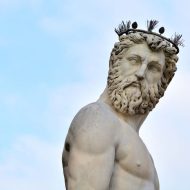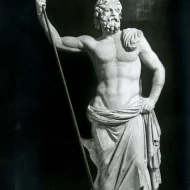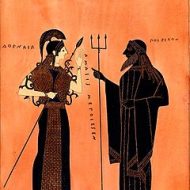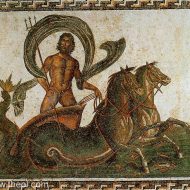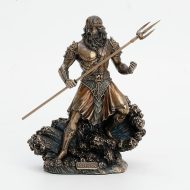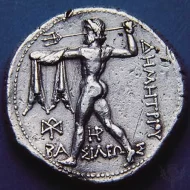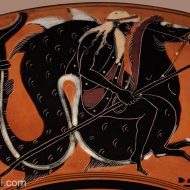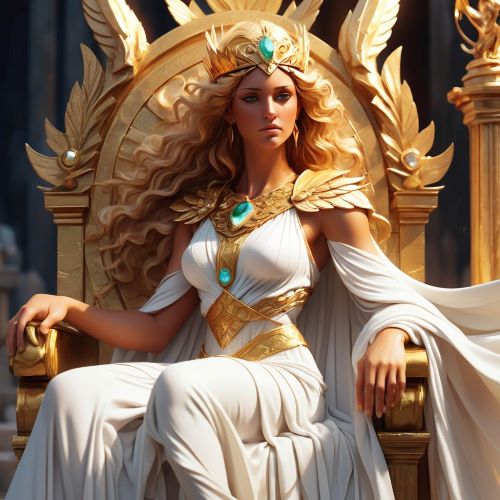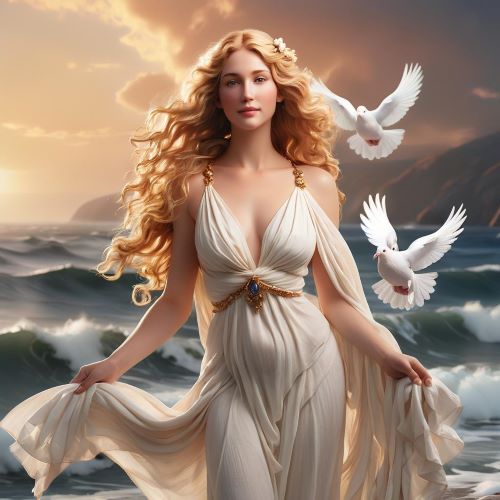Poseidon : God of the Sea
Listen
At a glance
| Description | |
|---|---|
| Origin | Greek Mythology |
| Classification | Gods |
| Family Members | Rhea (Mother), Cronus (Father), Hestia, Demeter, Hades, Hera, and Zeus (Siblings) |
| Region | Mediterranean |
| Associated With | Sea, Horses, Earthquakes |
Posiedon
Introduction
The Greek god of the seas, mariners, earthquakes, and horses, Poseidon, was a strong Olympian. Poseidon was revered throughout the whole Greek world, but seafaring city-states like Athens and Corinth were where he was most revered.
Poseidon was one of the main Olympian gods, and his might was second only to that of his brother Zeus. He was a stubborn god. He consequently had a significant role in numerous Greek mythology. He was frequently seen riding majestic horses or brandishing a threatening trident.
Physical Traits
Poseidon was typically shown as an old god who was well-built and had a beard. He fought, controlled the water, and sparked earthquakes with his characteristic three-pronged spear, the trident.
Poseidon, the deity of horses, was frequently depicted driving a chariot pulled by hippocampi, hybrid animals that slithered across the seas. Dolphins, seahorses, tuna, and bulls were just a few of the various land and sea creatures that Poseidon was linked to.
Family
Poseidon was conceived by the union of Rhea and Cronus, Titans who governed the universe before the creation of the Olympian pantheon, together with his siblings Hestia, Demeter, Hades, Hera, and Zeus. One version claims that Rhea, like Zeus, saved Poseidon from being sucked up by Cronus. Rhea gave birth to Poseidon by pretending to give birth to a foal and giving it to Cronus for him to devour.[10] This myth illustrates Poseidon’s connection to horses.
Together with Zeus and his other siblings, Poseidon fought valiantly in the titanic struggle known as the Titanomachy. Zeus, Hades, and Poseidon, who were male and hence privileged to govern in Greek culture after defeating the Titans, took control of the cosmos and divided it into realms. Amphitrite, one of the Nereid nymphs and a character traditionally linked with the sea (and salt water in particular), was married by Poseidon. They had three kids together: the merman Triton, the goddess of Rhodes and eventual bride of Helios Rhodos, and Benthesicyme.
Poseidon was famed for his numerous affairs and ferocious sexual exploits, just like other male deities. He had a large number of illegitimate children, including some of Greek mythology’s most renowned characters. He produced two legendary creatures: Charybdis, a sea monster who lurked in the Straits of Messina and caused enormous, persistent whirlpools to snare unwary travellers; and Antaeus, a giant who engaged Hercules in combat during the Twelve Labours.
Other names
The origins of the term “Poseidon” perhaps lie in two different words. The first of these comes from the Proto-Indo-European root *pótis, which is itself derived from the Greek word posis. The meanings of both words are “husband,” “lord,” and “master.”
Powers and Abilities
In Greek mythology, Poseidon, the god of the sea, was a powerful deity associated with various aspects of the sea and its influence. His primary domain and power resided in the sea, and he had the ability to manipulate the waters. This included causing storms, calming seas, and creating natural disasters like tsunamis and earthquakes by striking the Earth with his trident.
Poseidon was often referred to as “Earthshaker” due to his capacity to cause earthquakes. His trident, a three-pronged spear, symbolized his authority over the sea and was sometimes used to stir up storms or create springs of water. He could shape and influence the physical geography of the world by creating islands and freshwater springs through the striking of his trident.
Poseidon also had command over the creatures of the sea. He could summon and control marine animals, including dolphins and sea monsters, which often served as his messengers or allies. Additionally, Poseidon was associated with horses and was believed to have created the first horse. He could also produce horses from the earth, making him a god of horsemanship.
As the protector of sailors and seafarers, Poseidon was highly revered by those who relied on the sea for their livelihoods. Sailors would often pray to him for safe journeys, and he could grant them calm seas or aid them in times of trouble. He was known to engage in competitions and contests with other gods to assert his dominance and control, such as the famous contest with Athena for the patronage of Athens.
Poseidon’s control over weather patterns, especially those related to the sea, was another aspect of his power. He could summon and calm storms as he saw fit, showcasing his authority over the elements and his role as a deity who wielded immense influence over the natural world.
Modern Day Influence
In modern-day pop culture, the influence of Poseidon, the Greek god of the sea, remains palpable in various forms of media, literature, and entertainment. While not as prominent as some other mythological figures, Poseidon’s legacy endures through the enduring fascination with the ocean and its mysteries. The sea itself continues to be a rich source of inspiration for countless novels, films, and television series, often featuring majestic underwater kingdoms or epic adventures on the high seas.
Additionally, contemporary adaptations of ancient myths and legends frequently draw upon Poseidon’s character as a formidable and unpredictable force of nature, showcasing his ability to conjure storms and tsunamis. Furthermore, his symbol, the trident, has become an iconic image, often seen in logos, emblems, and even as a motif in various pop culture contexts. In essence, Poseidon’s influence persists, serving as a symbol of the enduring power and allure of the sea in the modern imagination.
Related Images
Frequently Asked Questions
What is the Poseidon known for?
In Greek mythology, Poseidon reigns supreme over the seas, commanding storms, crafting earthquakes, and gifting humanity with the noble steed. As both a fearsome earthshaker and nurturing source of life, he stands as a powerful Olympian, his trident forever reminding mortals of the ocean’s untamed might and hidden depths.
Was Athena married to Poseidon?
Athena, the goddess of wisdom, war, and crafts, spurned the bonds of marriage in Greek myth. A dedicated virgin known as “Athena Parthenos,” she navigated complex relationships with gods like her father Zeus and rival Poseidon, but remained unwed. Marriage held no sway over her devotion to knowledge, battle, and skilled artistry.
Who is Poseidon in love with?
Poseidon’s heart belonged to Amphitrite, the sea goddess he wooed, wed, and raised a watery family with. Yet, the ocean king couldn’t resist a dalliance or two, fathering children across myth – a tale of passionate love mixed with impulsive romance, forever echoing in the waves.
Did Poseidon love Medusa?
Myths whisper both yes and no. He found her beautiful, their union birthed mythical children, yet Athena’s fury suggests the encounter wasn’t bathed in love’s light. Poseidon’s track record of fleeting flings adds further shadow. Ultimately, their story leaves a question mark hanging over the ocean’s depths, inviting your own interpretation of a god’s desires.
Who was Poseidon's wife?
Poseidon’s wife in Greek mythology was Amphitrite, a Nereid and goddess of the sea. She initially resisted his passionate pursuit, even fleeing to the ends of the Earth, but he eventually won her hand. They ruled the oceans together, residing in a coral palace and raising several children, including the famous merman Triton. While Poseidon had numerous other encounters and romances, Amphitrite remained his devoted wife and queen of the deep.

